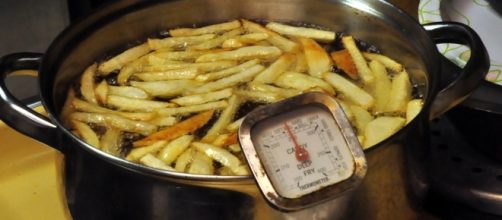My wife calls me the recipe Revisionist and you'll soon learn why if you continue reading this series of recipes and cooking ideas from a trained physicist who grew up in a hotel and just happened to work at the TV station where Julia Child got her start in the US. Now that I’m retired I get to spend a lot of time cooking and I always like to try something different, often combining commercial cooking ideas with home cooking in some special way - using a water oven, cooking with no sugar, no carbohydrates, etc. Since this is a British news channel, where better to start than with chips.
What gives chips their flavor?
Near the end we'll look at a bit of culinary craziness that will go against everything you think you know about fried food. But to start we need to look at some of the science of frying and in particular fried potatoes. In the UK you call them chips. In the US they're called french fries, but they are both the same thing - thin slices of potatoes fried in Oil to produce that brown crust which has all the taste.
Browning serves the same function in potatoes as it does with meat - it's the result of a chemical reaction, the Maillard reaction named for French scientist Louis Camille Maillard (1878-1936.) Maillard is the one who discovered the browned part is where the flavor is in fried foods.
That’s why a fried hamburger tastes a lot better than one cooked in boiling water and darker chips have more flavor.
Potato chips (crisps to you) taste even better than chips because there is a lot more surface to produce the brown acrylamide which is what the Maillard reaction produces in potatoes.
Fry chips in cold oil.
Now we get to the strange way I often fry potatoes. We all know that you have to start with very hot oil - 163 degrees C is the recommended temperature - to get the perfect chips. Of course, that means you are risking a minor or major disaster if you are doing this on a stove because when those water-filled potatoes hit the hot oil the water on the chip's surface bursts into steam and the oil boils up, sometimes splattering you with hot oil or spilling over the sides of the pan, perhaps starting a fire.
So you rinse the starch off the raw chips and pat them dry or even flour them and that greatly reduces the amount of water and steam.
But what are you to do? Everyone knows that if the oil isn’t hot enough the chips will be soggy from absorbing a lot of cold oil.
Everybody’s wrong!
Think about it for a second and you’ll see the fallacy. Sliced potatoes are just oozing water, so even if the oil is only 50 C how can any oil penetrate the surface of the uncooked chip? After all it's hard enough to get oil and water to mix when you want them to in salad dressing.
I accidentally found the solution to the hot oil and wet potato conundrum when I was rushed and dumped prepared raw chips into what I thought was hot oil but was actually at room temperature.
I could either toss out the last of my potatoes or try cooking them as is.
With nothing to lose, I turned on the heat and as the oil heated the water slowly evaporated and gently boiled off starting when the oil hit 100 C.
The final result was perfectly good chips and zero splatters.
I know it sounds ridiculous but you can fry chips starting with cold oil and no one will be able to tell the difference. It is safer and you don't even need a thermometer - just cook until they reach the desired color.
Don’t believe me? I don’t blame you but risk a small potato and find out for yourself - be a kitchen scientist - take your first step into molecular gastronomy.

